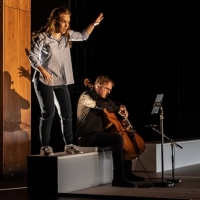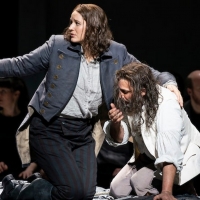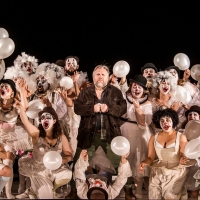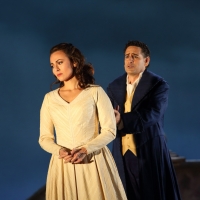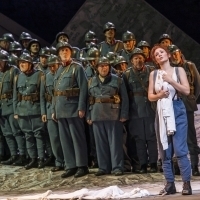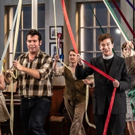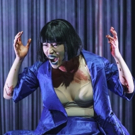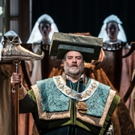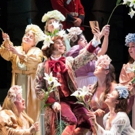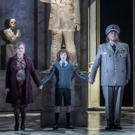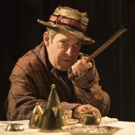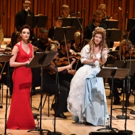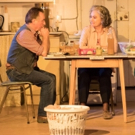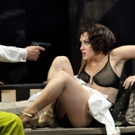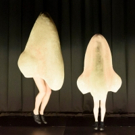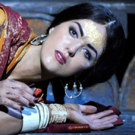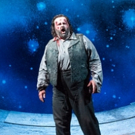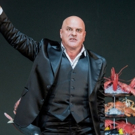Alexandra Coghlan
MOST POPULAR ARTICLES
March 14, 2020
On 15 November, 2016, Russian teenagers Katya Vlasova and Denis Muravyov ran away from home and barricaded themselves inside a cabin with whisky, guns and ammunition. After firing on family and at police the two 15-year-olds found themselves in a stand-off with Special Forces, which only ended when the men stormed the building. Both teenagers were subsequently found dead. The whole sequence of events was live-streamed by the pair on Periscope, turning them into a Romeo and Juliet or Bonnie and Clyde for the internet age.
March 2, 2020
On reflection, we should have been more suspicious. But when the curtain rose on a solid, period Fidelio complete with lowering prison walls and lank-haired French revolutionaries, a basket of freshly guillotined heads adding some grisly colour, it was easy to settle in for a breeches and muskets romp. Of course, German director Tobias Kratzer had no such intention.
February 13, 2020
There must have been a two-for-one offer on the day director Barbora Horakova visited the Regietheater prop-store to kit out her Luisa Miller for English National Opera. White walls and plenty of black marker pens to daub on them; geometric structures; sinister clowns; a chorus all costumed somewhere between circus-freak and sexy-Bedlam; a quartet of contemporary dancers scraping and draping themselves across the set: we got them all in this hectic, wilful, defiantly joyless staging of Verdi's tragedy of love across the class divide.
September 18, 2019
Fashions in love (and lovers) swing as wildly as hemlines between the centuries. Massenet's Werther a?' brooding, poetic, Romantic to a fault a?' is pure 19th century, his heart beating to the fluttering pulse of lyric couplets. He translates poorly into today's more pragmatic world, but thanks to Charles Edwards' handsome designs his ill-fated passion for married Charlotte returns to the Royal Opera with plenty of nostalgic appeal.
July 12, 2019
Lighter than a macaron and every bit as deliciously Gallic, Donizetti's La fille du regiment swaps the composer's signature brand of robust, Italian comedy for something frothier, more melt-in-the-mouth. Add to that director Laurent Pelly - go-to Frenchman for whimsy and colour - and you have a classic operatic amuse-bouche.
May 30, 2019
We haven't seen a lot of Smetana's The Bartered Bride in the UK recently. Bohemia's best-loved opera is rapidly becoming one of the repertoire's best-kept secrets, which is a shame because it's an enchanting comedy, whose colourful, folk-filled score might be propelled by exotic polka rhythms, but whose human drama feels deliciously close to home.
May 17, 2019
God it's good to have the Linbury back. The reopening of the Royal Opera House's second, smaller space last December after a lengthy redesign brought with it all kinds of possibilities. Repertoire excised from schedules or exiled (with mixed success) to partner venues could finally return, with whole swathes of contemporary and period repertoire suddenly back in the house. Since then we've seen a thoughtful world premiere (Gavin Higgins' The Monstrous Child), a quite brilliant bit of Handel (Berenice) and now a new staging of Henze's late chamber opera Phaedra.
March 12, 2017
Is it possible that Kasper Holten, Covent Garden's outgoing director of opera, has directed a Meistersinger about himself? It certainly looks a lot like it. This black take on Wagner's sunniest and most humane opera finds doubts and uncertainties at every turn, closing not with a paean to national art but a cautionary tale about cultural insularity and convention.
March 9, 2017
'What a very singularly deep young man that deep young man must be!' You don't have to look very far in selfie-taking 2017 for an equivalent to the narcissism and aestheticism that are so thoroughly sent up in Gilbert and Sullivan's 1881 Patience. So perhaps it's best that director Liam Steel has left all that to look after itself, and instead of a topical satire has produced an unapologetic period romp, with just a few too many smutty moments for complete comfort.
February 28, 2017
If a sad tale really is best for winter, then we've certainly been blessed this year. For months the news has croaked out its nightly stories, each blacker than the one before, and though blossom is already on the trees there's not been so much as a whiff of a happy ending. Certainly not at English National Opera, where composer Ryan Wigglesworth and director Rory Kinnear have recut Shakespeare's play into something even more darkly ambiguous than its source.
February 16, 2017
'What did you do during the war, Dada?' Somewhere underneath the relentless punning and the pastiche, the whistle-stop wit and the whirling theoretical debate, there's a seriousness to Tom Stoppard's 1974 Travesties that feels horribly prescient. The intellectual hijinks are genuinely hilarious, but there's no disguising the weight of the question they restlessly scamper over and clamber round: what can artists do when faced with social crisis? Can their work claim political agency, or are they just schoolboys with a chit to get them off chores, daubing happily away in a corner?
November 29, 2016
It couldn't have been better timed. When Gerald Barry started work on his latest project - an operatic take on Alice's Adventures in Wonderland - the world was still rotating smoothly on its axis, business as usual. But fast-forward a year to the European premiere and we find ourselves in a topsy-turvy alternative reality, with a celebrity president, a UK soon to be out of Europe, and madness everywhere we turn. Suddenly a trip down a rabbit-hole seems less a fantasy than a mirror for absurdities rather closer to home. But if the absurdity feels familiar, the mood is quite the reverse, because Barry's opera is utterly, bewitchingly joyful - 50 minutes of batter-you-round-the-head-with-a-bunch-of-flowers brilliance.
November 25, 2016
Three sixty-something retired scientists talk to one another in a remote seaside cottage for two hours. It doesn't sound like theatrical gold, but in Lucy Kirkwood's deft hands, an unassuming premise becomes transformed by a quiet dramatic alchemy. The Children isn't a play that shouts, but it's one whose whispers carry far and linger even longer - a warm, funny and devastating portrait of the end of the world as we know it.
November 10, 2016
Beautiful, unknowable Lulu - all things to all men, who has 'never pretended to be anything by what men see in me' - is the chameleon-heroine revealed in Berg's musical mirror. But just as she reinvents herself with each new gaze, so the opera itself morphs and shifts with passing time, reflecting back the concerns of each age. A smudgy parable about German economic growth becomes by turns a sharply-drawn feminist critique or a Freudian exploration of pleasure. This week, in a post-truth world crowned by a Trump presidency, Lulu looks like a timely tale of illusion and reality and the danger when you can no longer tell the difference between the two.
November 9, 2016
Glass panels, windows and boxes on stage should always be treated with mistrust. There can be no clearer indication of blood to come - a literal trigger warning, a physical spatter alert. Think of the gorgeous glass house of Benedict Andrews's 2011 The Return of Ulysses for ENO just waiting to be smeared and smudged, or of Gloucester restrained in his glass prison in the RSC's recent Lear just waiting for that moment. We don't have long to wait for the gore in Gerard Jones's Oreste. Barely ten seconds into the overture blood spurts and audience gasps. It's the first and final shock of a production that unfolds thereafter with tedious and maddening inevitability.
October 21, 2016
Composed when Shostakovich was just 21 years old, fresh from the conservatoire and still high on the success of his First Symphony, The Nose is a piece of musical rebellion - a fantasy of abrasive, rule-breaking joie de vivre whose absurd, anarchic rompings and musical shape-shiftings conceal a political switchblade under their brightly-coloured clothes. This is pantomime, certainly, but adult pantomime. Never before staged at the Royal Opera, the piece now makes a belated debut, and in the hands of Australian director Barrie Kosky it looks scarcely less radical now than it would have done back in 1928.
October 20, 2016
You have to get through an awful lot of shell to even glimpse the jewel at the core of The Pearl Fishers. Bizet's opera is much more than just a good duet - the score is glossy with melody, propelled along by some rollicking choruses - but the situation is so awkward, the plot so absurd (yes, even by operatic standards) that getting to the good stuff can prove almost impossible. Penny Woolcock's 2010 production, revived here for the second time, does a seductive visual dance in a desperate attempt to distract from the opera's flaws, but ends up just drawing more attention to them.
October 4, 2016
When Catherine Malfitano's Tosca debuted in 2010, English National Opera finally had a production of Puccini's classic to rival Jonathan Kent's long-serving version up the road at Covent Garden. Handsome, traditional, revivable - the show is everything it should be. But that extra friction that turns solid into spectacular is left entirely in the hands of the cast. With one role debut and one company debut among its principals, on paper this second revival was a bit of an unknown quantity. In practice it's an uneven affair, but the good is so very excellent that you'll forgive it much.
October 1, 2016
English National Opera has been having a hard time with Don Giovanni lately. First there was Calixto Bieito's groggy, pastel-coloured nightmare (who could forget the pistachio leather dentist's chair), which paled into adequacy when compared to Rufus Norris's bafflingly unlovely (and just generally baffling) vision that followed. Richard Jones's new production is in no way a failure - there's far too much intelligence here for that, as well as more than one flash of utter brilliance - but it still feels like a show as yet not fully in focus. At his best Jones can make the most startlingly revisionist concept seem like it has always been staring you in face. Here his reading intrigues, compels, but never feels fully rooted in Mozart's music-drama.
Videos


